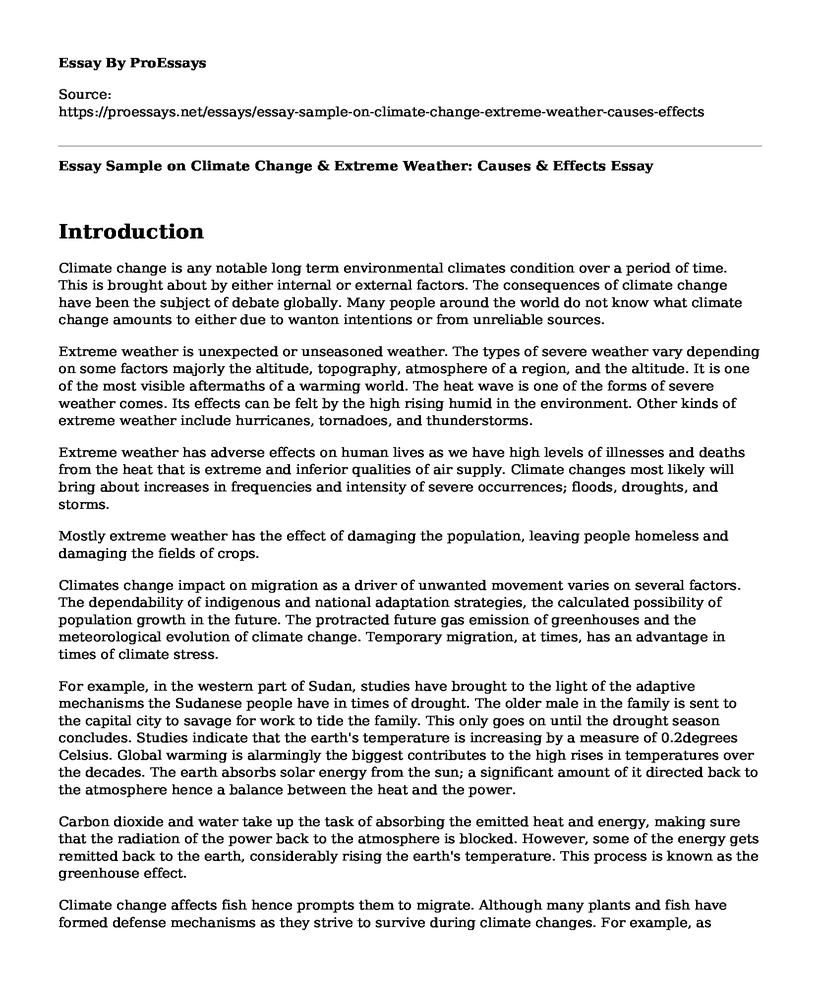Introduction
Climate change is any notable long term environmental climates condition over a period of time. This is brought about by either internal or external factors. The consequences of climate change have been the subject of debate globally. Many people around the world do not know what climate change amounts to either due to wanton intentions or from unreliable sources.
Extreme weather is unexpected or unseasoned weather. The types of severe weather vary depending on some factors majorly the altitude, topography, atmosphere of a region, and the altitude. It is one of the most visible aftermaths of a warming world. The heat wave is one of the forms of severe weather comes. Its effects can be felt by the high rising humid in the environment. Other kinds of extreme weather include hurricanes, tornadoes, and thunderstorms.
Extreme weather has adverse effects on human lives as we have high levels of illnesses and deaths from the heat that is extreme and inferior qualities of air supply. Climate changes most likely will bring about increases in frequencies and intensity of severe occurrences; floods, droughts, and storms.
Mostly extreme weather has the effect of damaging the population, leaving people homeless and damaging the fields of crops.
Climates change impact on migration as a driver of unwanted movement varies on several factors. The dependability of indigenous and national adaptation strategies, the calculated possibility of population growth in the future. The protracted future gas emission of greenhouses and the meteorological evolution of climate change. Temporary migration, at times, has an advantage in times of climate stress.
For example, in the western part of Sudan, studies have brought to the light of the adaptive mechanisms the Sudanese people have in times of drought. The older male in the family is sent to the capital city to savage for work to tide the family. This only goes on until the drought season concludes. Studies indicate that the earth's temperature is increasing by a measure of 0.2degrees Celsius. Global warming is alarmingly the biggest contributes to the high rises in temperatures over the decades. The earth absorbs solar energy from the sun; a significant amount of it directed back to the atmosphere hence a balance between the heat and the power.
Carbon dioxide and water take up the task of absorbing the emitted heat and energy, making sure that the radiation of the power back to the atmosphere is blocked. However, some of the energy gets remitted back to the earth, considerably rising the earth's temperature. This process is known as the greenhouse effect.
Climate change affects fish hence prompts them to migrate. Although many plants and fish have formed defense mechanisms as they strive to survive during climate changes. For example, as temperatures peak, plants start to grow and bloom much earlier in spring, and hence they survive much longer into the fall. High levels of carbon dioxide into the environment is a good thing for plants growth. Carbon dioxide is a component for making food in plants; hence, it can enhance yields. Warmer waters mostly have the effect of speeding up the metabolism in fishes.
Climate change mores so affects insect-borne diseases, and a warming planet plays right into the breeding of mosquitoes, which is a challenge in most African countries. Most of these diseases are excellent as it enables the strengthening of the health systems around the world. There is a ray of hope that conditions that had no cure or preventions, now researchers have medicine to curb or prevent them.
Conclusion
In conclusion, warnings have begun to fall on deaf ears worldwide; not one listens to the adverse change our environment has suffered over the years. Gases are still on high to be emitted into the atmosphere, whereas globalization is at a peak. More companies to issue more gases. The amount of waste found in our oceans is alarming. Most of the problems associated with climate change we implicit upon ourselves.
People need to be aware of the risks we face in the future if this goes on. Perhaps by the year, 2030 things might have gotten worse. Fewer people are addressing the giant at hand than we would expect. There is no single 'we' when it comes to energy nor for fragility when it comes to environmental imperil. Climate change is not the same as the other problems related to the environment. Climate change is more significant in space and complexity.
The emissions bring about changes in the climate are a consequence of centrally billions of people over the decades. Such is the case that scientists are studying for life in other planets. It's high time the world came as one to voice the grand problem that is on a continuous rise decades after decades. Let's leave a better world for future generations.
References
Stern, N. H., & Great Britain. The economics of climate change: The Stern review. Cambridge, UK: Cambridge University Press. (2007).
Cite this page
Essay Sample on Climate Change & Extreme Weather: Causes & Effects. (2023, Mar 16). Retrieved from https://proessays.net/essays/essay-sample-on-climate-change-extreme-weather-causes-effects
If you are the original author of this essay and no longer wish to have it published on the ProEssays website, please click below to request its removal:
- Ice Age Theories
- The Size Range and Shape of the Volcano Type
- Valuing Environmental Impacts of Development - Paper Example
- Essay on Global Warming in Relation to Vegetarians
- Environmental Impact of Personal Lifestyle: Throwing Litter Essay
- How Global Warming is Not Caused by Humans?
- Protecting the Environment: The Role of Economic Incentives - Essay Sample







